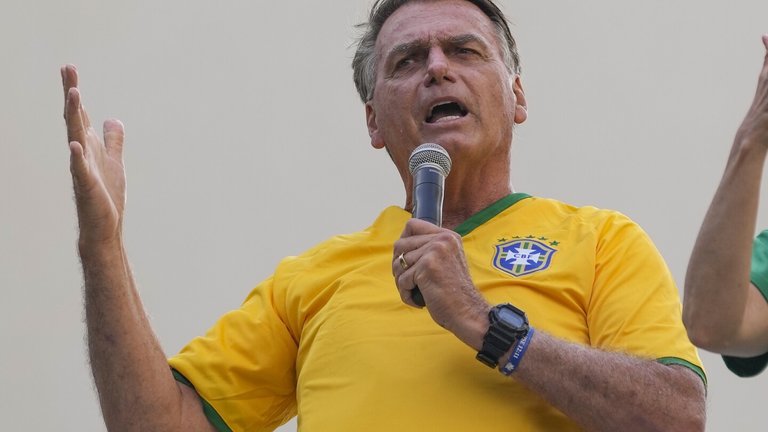The Latin American Report # 378

This week, after some two years of inquiries, Brazilian police formalized its indictment against controversial former President Jair Bolsonaro for allegedly being involved in a coup attempt that would have included an assassination attempt against then President-elect Lula da Silva. “The attempt to poison me and Alckmin didn't work and here we are,” the Brazilian president said last Thursday. The effort to break the democratic order would have counted on the assistance of dozens of former ministers and senior aides, reports Reuters. Bolsonaro never accepted his defeat to Lula in what was certainly a close election. His Trump-like narrative fueled a concert of doubts about the Brazilian electoral system that led thousands of his followers to violate the headquarters of the main federal bodies—including the Planalto Palace—in January 2023, in a sort of South American Jan. 6th.
Sometimes I find it very hard to believe that a president would be directly involved not in an attempt to alter the democratic order but in an attempt to assassinate a president-elect. Prosecutor General Paulo Gonet will decide whether or not to file charges against Bolsonaro once judge Alexandre de Moraes—the same from the symbolic-judicial battle against Elon Musk—relays him the 884-page police report, something that would cloud even more the conservative leader's options to bid for power again and try to monetize the considerable political capital he still enjoys. “Gonet is very technical. In addition to the investigation itself, there is all the legal basis for the indictments to be analyzed. This will take time,” a source told Reuters about the deliberations of the prosecutor, who plans to concentrate all ongoing investigations against Bolsonaro into a single indictment. Brazil's far-right leader has called the investigation a fabrication amid an alleged witch-hunt against him.
 Source
SourceIs Sheinbaum bending the knee before North America?
If anything characterized Andrés Manuel López Obrador's six-year term at the helm of the Mexican nation, it was his zeal for his country's sovereignty, and for respecting its independence when making decisions. In principle, Claudia Sheinbaum is continuity in this and other dimensions of government management, such as the complicated confrontation of insecurity. But this week, in the aftermath of the G-20 summit in Rio de Janeiro, threats and accusations from the United States—especially from the administration knocking on the doors of the White House—and an aggressive Canada over trade relations with China have put Sheinbaum on the ropes. The specter of protectionism again. She seems to have given in somewhat to US pressures, even committing herself in a rather obsequious manner to reduce the trade imbalance with the Asian giant. “In the meetings we have with Canada and (U.S. President-elect) Trump, we'll show that the idea that (Chinese) products are entering through Mexico is false,” Sheinbaum said yesterday.
“We have a plan [...] for substituting those imports coming from China and producing most of them in Mexico, either with Mexican companies or with companies mainly from North America” or from other (European) countries, defended the head of the Zócalo Square. “I have already started talking to the 50 companies that import the most things from [abroad] to tell them, explain to me what part of this we can do in Mexico and how [we] can help you to do it in [our] country”, said AMLO's former Foreign Minister and now Secretary of Commerce Marcelo Ebrard in this sense, as the local industry prepares for manufacturing microchips. The Morenista bloc in Congress has also modified legislative projects to comply with some requirements of the T-MEC agreement signed during the administration of Donald Trump. “What is being done is a reform to make it almost the same as it is in the United States,” Ebrard said in a statement that I found rather unhappy.
Afraid of losing the U.S.-Canada trade pact, Mexico alters its laws and removes Chinese parts https://t.co/kSQa2yULTT
— The Globe and Mail (@globeandmail) November 23, 2024
Uruguay
Tomorrow is run-off vote day in Uruguay, in which citizens will decide between two electoral offers that tend to the center without big differences in their economic proposals. The opposition candidate of the Broad Front seems to have a little more momentum, and sells the simple majority of his coalition in the Senate as a factor to be taken into account to ensure better governance levels. However, it is noteworthy that political differences in Uruguay are channeled without the harshness that characterizes the rest of the region. The country is one of the least plunged into the cancer of organized crime, although violence is an increasingly serious problem to be addressed along with chronic concerns such as the high cost of living and inequality.
In razor-tight Uruguay election, fringe votes could tip the balance https://t.co/r2p8GMYgKS pic.twitter.com/jcQwIAHbvs
— Reuters (@Reuters) November 22, 2024
And this is all for our report today. I have referenced the sources dynamically in the text, and remember you can learn how and where to follow the LATAM trail news by reading my work here. Have a nice day.

